Auditing and Assurance Services Report - BUACC5935, Semester 1, 2019
VerifiedAdded on 2022/11/14
|13
|4263
|1
Report
AI Summary
This report provides a comprehensive analysis of auditing and assurance services, focusing on the role of the Big Four accounting firms (PwC, KPMG, Deloitte, and EY) and their potential scrutiny by the Banking Royal Commission. The report delves into the importance of auditor independence, non-audit services, and audit quality, highlighting the potential conflicts of interest and their impact on audit outcomes. It discusses the opportunities and challenges facing the Australian auditing profession in the 21st century, including the integration of Artificial Intelligence and the increasing demands for transparency. Furthermore, the report examines recent regulatory attempts to improve audit quality, supported by relevant examples such as the collapses of Lehman Brothers and Thornburg Mortgage, and references to key articles and materials. The report concludes with a discussion on the need for auditors to maintain a fair distance from the financial system to ensure proper audit practices and maintain public trust.
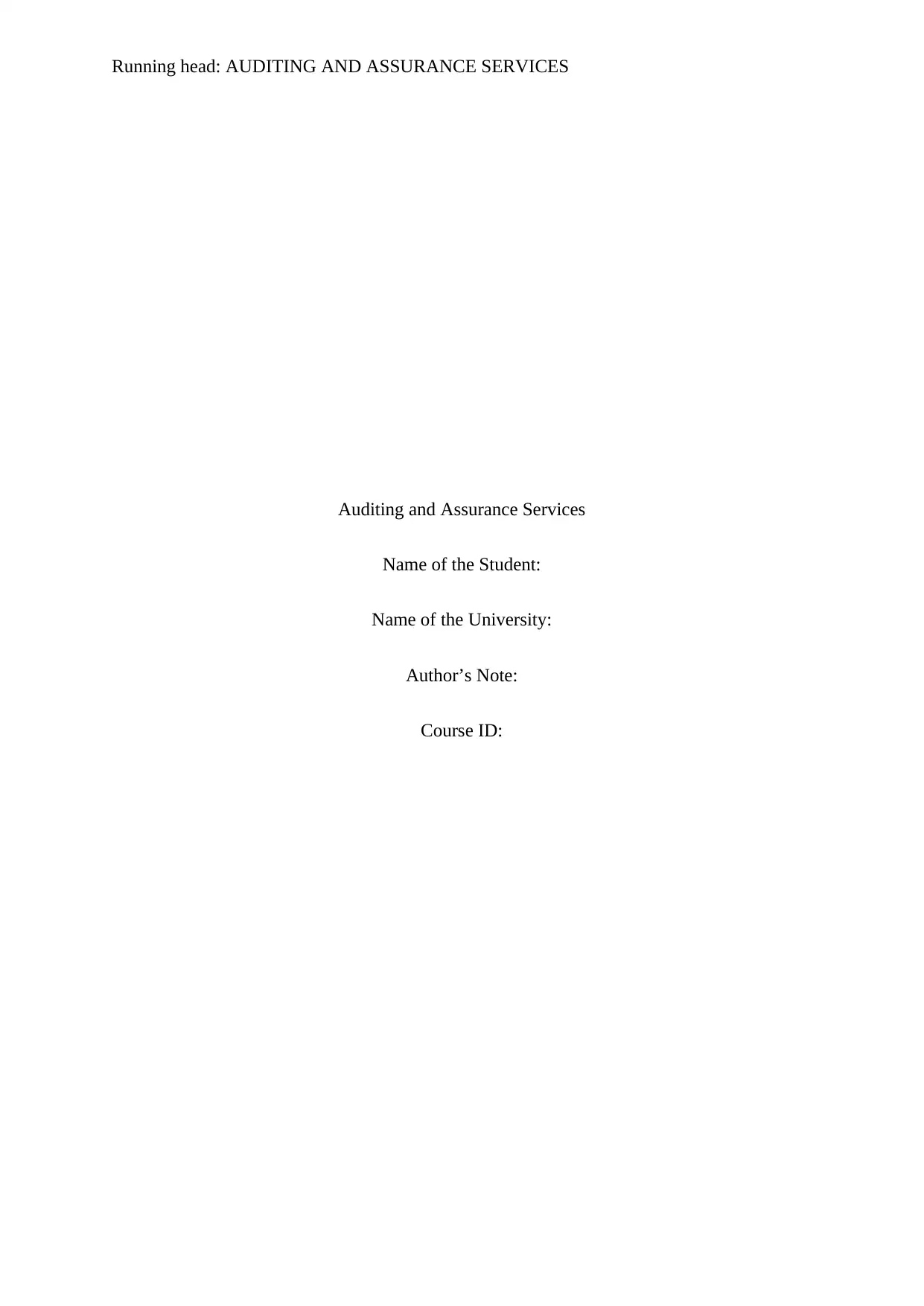
Running head: AUDITING AND ASSURANCE SERVICES
Auditing and Assurance Services
Name of the Student:
Name of the University:
Author’s Note:
Course ID:
Auditing and Assurance Services
Name of the Student:
Name of the University:
Author’s Note:
Course ID:
Paraphrase This Document
Need a fresh take? Get an instant paraphrase of this document with our AI Paraphraser
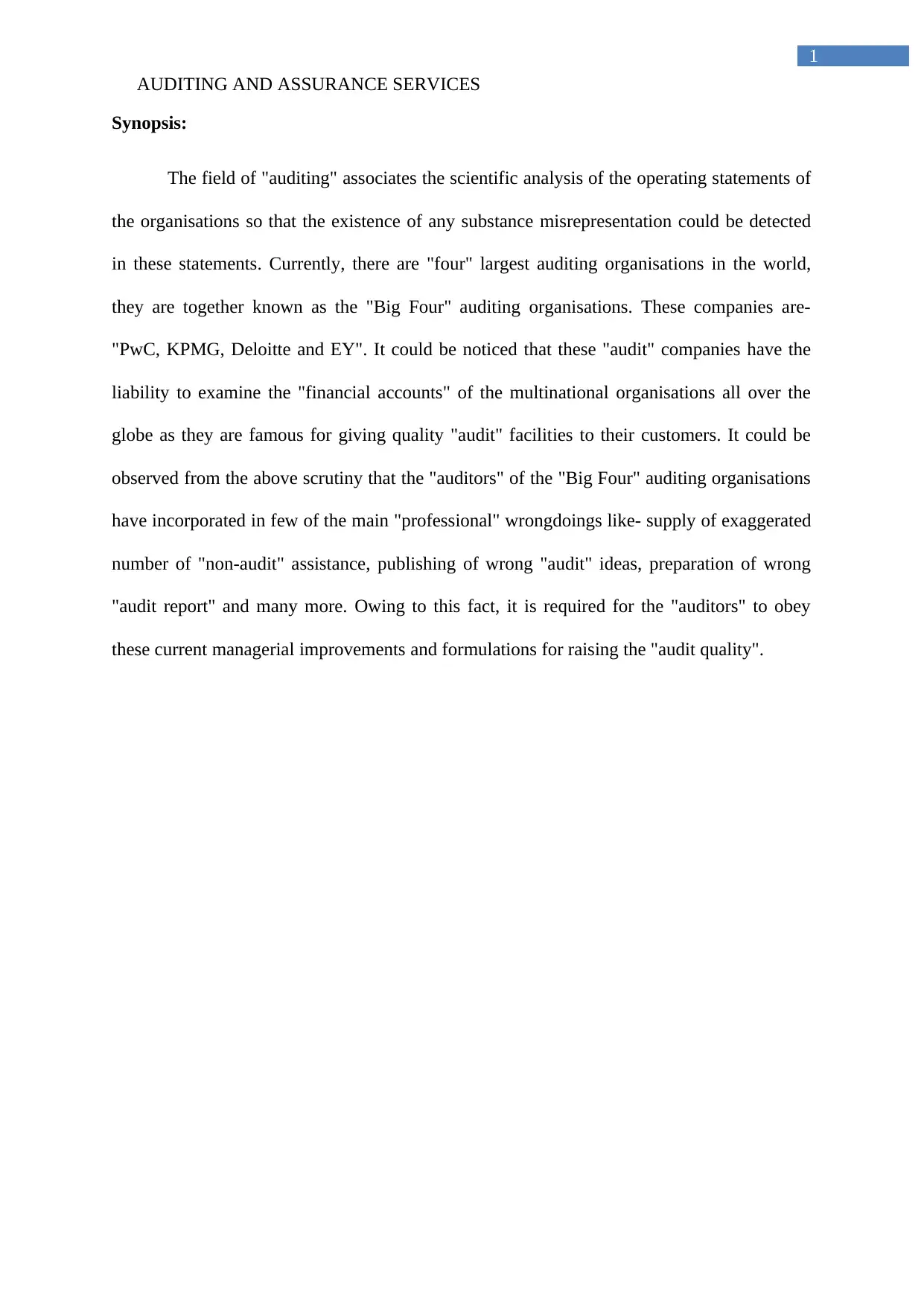
1
AUDITING AND ASSURANCE SERVICES
Synopsis:
The field of "auditing" associates the scientific analysis of the operating statements of
the organisations so that the existence of any substance misrepresentation could be detected
in these statements. Currently, there are "four" largest auditing organisations in the world,
they are together known as the "Big Four" auditing organisations. These companies are-
"PwC, KPMG, Deloitte and EY". It could be noticed that these "audit" companies have the
liability to examine the "financial accounts" of the multinational organisations all over the
globe as they are famous for giving quality "audit" facilities to their customers. It could be
observed from the above scrutiny that the "auditors" of the "Big Four" auditing organisations
have incorporated in few of the main "professional" wrongdoings like- supply of exaggerated
number of "non-audit" assistance, publishing of wrong "audit" ideas, preparation of wrong
"audit report" and many more. Owing to this fact, it is required for the "auditors" to obey
these current managerial improvements and formulations for raising the "audit quality".
AUDITING AND ASSURANCE SERVICES
Synopsis:
The field of "auditing" associates the scientific analysis of the operating statements of
the organisations so that the existence of any substance misrepresentation could be detected
in these statements. Currently, there are "four" largest auditing organisations in the world,
they are together known as the "Big Four" auditing organisations. These companies are-
"PwC, KPMG, Deloitte and EY". It could be noticed that these "audit" companies have the
liability to examine the "financial accounts" of the multinational organisations all over the
globe as they are famous for giving quality "audit" facilities to their customers. It could be
observed from the above scrutiny that the "auditors" of the "Big Four" auditing organisations
have incorporated in few of the main "professional" wrongdoings like- supply of exaggerated
number of "non-audit" assistance, publishing of wrong "audit" ideas, preparation of wrong
"audit report" and many more. Owing to this fact, it is required for the "auditors" to obey
these current managerial improvements and formulations for raising the "audit quality".
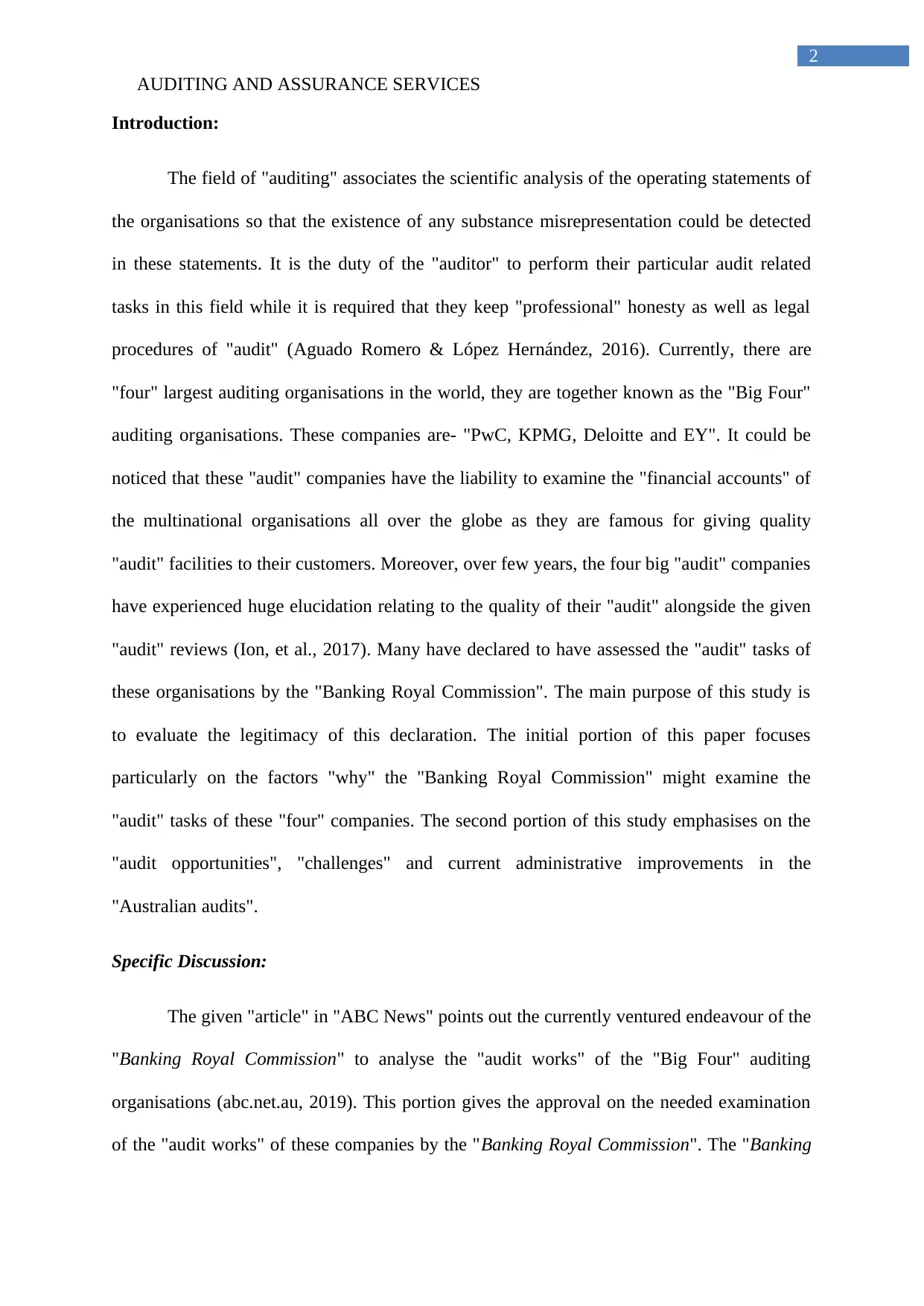
2
AUDITING AND ASSURANCE SERVICES
Introduction:
The field of "auditing" associates the scientific analysis of the operating statements of
the organisations so that the existence of any substance misrepresentation could be detected
in these statements. It is the duty of the "auditor" to perform their particular audit related
tasks in this field while it is required that they keep "professional" honesty as well as legal
procedures of "audit" (Aguado Romero & López Hernández, 2016). Currently, there are
"four" largest auditing organisations in the world, they are together known as the "Big Four"
auditing organisations. These companies are- "PwC, KPMG, Deloitte and EY". It could be
noticed that these "audit" companies have the liability to examine the "financial accounts" of
the multinational organisations all over the globe as they are famous for giving quality
"audit" facilities to their customers. Moreover, over few years, the four big "audit" companies
have experienced huge elucidation relating to the quality of their "audit" alongside the given
"audit" reviews (Ion, et al., 2017). Many have declared to have assessed the "audit" tasks of
these organisations by the "Banking Royal Commission". The main purpose of this study is
to evaluate the legitimacy of this declaration. The initial portion of this paper focuses
particularly on the factors "why" the "Banking Royal Commission" might examine the
"audit" tasks of these "four" companies. The second portion of this study emphasises on the
"audit opportunities", "challenges" and current administrative improvements in the
"Australian audits".
Specific Discussion:
The given "article" in "ABC News" points out the currently ventured endeavour of the
"Banking Royal Commission" to analyse the "audit works" of the "Big Four" auditing
organisations (abc.net.au, 2019). This portion gives the approval on the needed examination
of the "audit works" of these companies by the "Banking Royal Commission". The "Banking
AUDITING AND ASSURANCE SERVICES
Introduction:
The field of "auditing" associates the scientific analysis of the operating statements of
the organisations so that the existence of any substance misrepresentation could be detected
in these statements. It is the duty of the "auditor" to perform their particular audit related
tasks in this field while it is required that they keep "professional" honesty as well as legal
procedures of "audit" (Aguado Romero & López Hernández, 2016). Currently, there are
"four" largest auditing organisations in the world, they are together known as the "Big Four"
auditing organisations. These companies are- "PwC, KPMG, Deloitte and EY". It could be
noticed that these "audit" companies have the liability to examine the "financial accounts" of
the multinational organisations all over the globe as they are famous for giving quality
"audit" facilities to their customers. Moreover, over few years, the four big "audit" companies
have experienced huge elucidation relating to the quality of their "audit" alongside the given
"audit" reviews (Ion, et al., 2017). Many have declared to have assessed the "audit" tasks of
these organisations by the "Banking Royal Commission". The main purpose of this study is
to evaluate the legitimacy of this declaration. The initial portion of this paper focuses
particularly on the factors "why" the "Banking Royal Commission" might examine the
"audit" tasks of these "four" companies. The second portion of this study emphasises on the
"audit opportunities", "challenges" and current administrative improvements in the
"Australian audits".
Specific Discussion:
The given "article" in "ABC News" points out the currently ventured endeavour of the
"Banking Royal Commission" to analyse the "audit works" of the "Big Four" auditing
organisations (abc.net.au, 2019). This portion gives the approval on the needed examination
of the "audit works" of these companies by the "Banking Royal Commission". The "Banking
⊘ This is a preview!⊘
Do you want full access?
Subscribe today to unlock all pages.

Trusted by 1+ million students worldwide
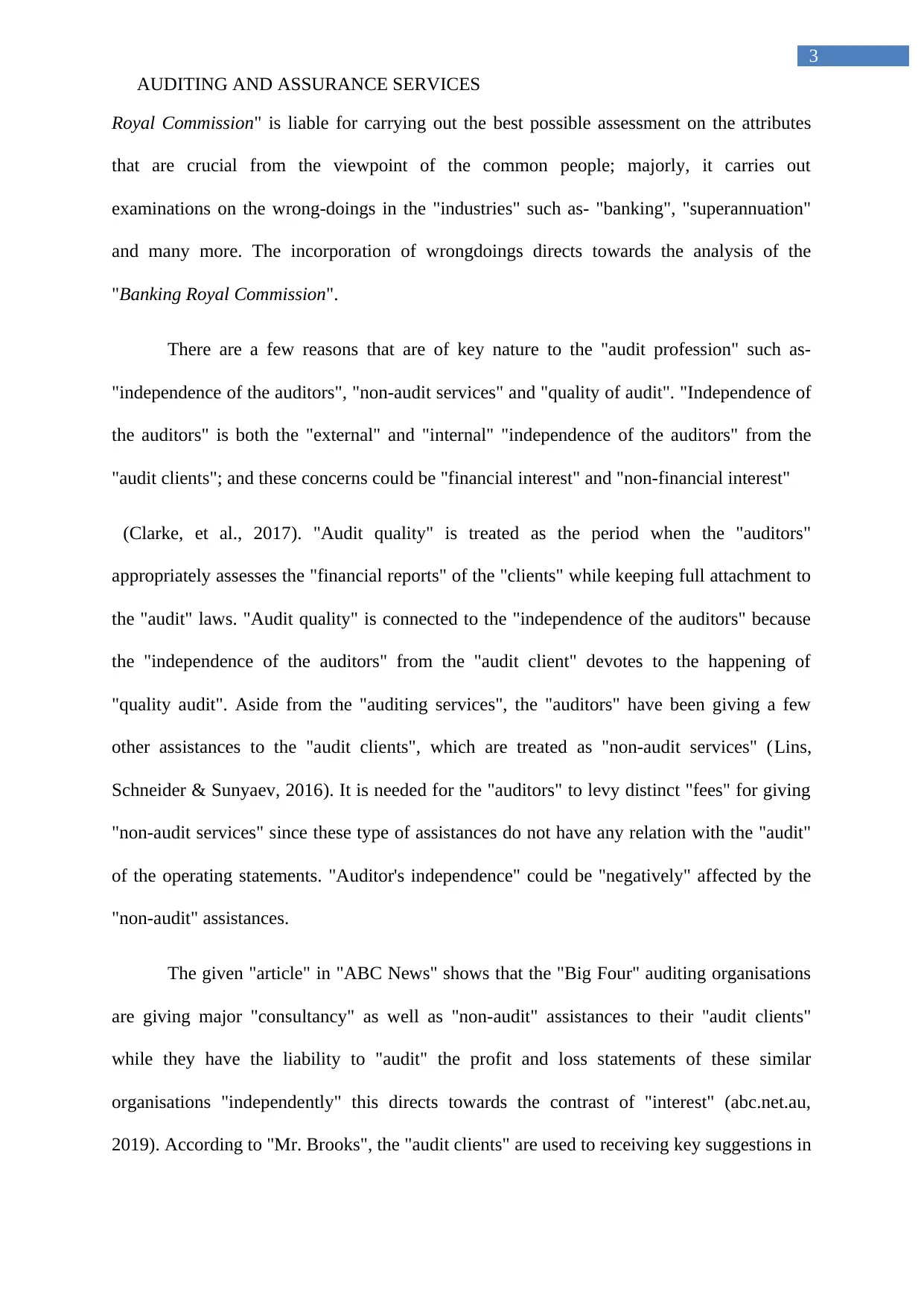
3
AUDITING AND ASSURANCE SERVICES
Royal Commission" is liable for carrying out the best possible assessment on the attributes
that are crucial from the viewpoint of the common people; majorly, it carries out
examinations on the wrong-doings in the "industries" such as- "banking", "superannuation"
and many more. The incorporation of wrongdoings directs towards the analysis of the
"Banking Royal Commission".
There are a few reasons that are of key nature to the "audit profession" such as-
"independence of the auditors", "non-audit services" and "quality of audit". "Independence of
the auditors" is both the "external" and "internal" "independence of the auditors" from the
"audit clients"; and these concerns could be "financial interest" and "non-financial interest"
(Clarke, et al., 2017). "Audit quality" is treated as the period when the "auditors"
appropriately assesses the "financial reports" of the "clients" while keeping full attachment to
the "audit" laws. "Audit quality" is connected to the "independence of the auditors" because
the "independence of the auditors" from the "audit client" devotes to the happening of
"quality audit". Aside from the "auditing services", the "auditors" have been giving a few
other assistances to the "audit clients", which are treated as "non-audit services" (Lins,
Schneider & Sunyaev, 2016). It is needed for the "auditors" to levy distinct "fees" for giving
"non-audit services" since these type of assistances do not have any relation with the "audit"
of the operating statements. "Auditor's independence" could be "negatively" affected by the
"non-audit" assistances.
The given "article" in "ABC News" shows that the "Big Four" auditing organisations
are giving major "consultancy" as well as "non-audit" assistances to their "audit clients"
while they have the liability to "audit" the profit and loss statements of these similar
organisations "independently" this directs towards the contrast of "interest" (abc.net.au,
2019). According to "Mr. Brooks", the "audit clients" are used to receiving key suggestions in
AUDITING AND ASSURANCE SERVICES
Royal Commission" is liable for carrying out the best possible assessment on the attributes
that are crucial from the viewpoint of the common people; majorly, it carries out
examinations on the wrong-doings in the "industries" such as- "banking", "superannuation"
and many more. The incorporation of wrongdoings directs towards the analysis of the
"Banking Royal Commission".
There are a few reasons that are of key nature to the "audit profession" such as-
"independence of the auditors", "non-audit services" and "quality of audit". "Independence of
the auditors" is both the "external" and "internal" "independence of the auditors" from the
"audit clients"; and these concerns could be "financial interest" and "non-financial interest"
(Clarke, et al., 2017). "Audit quality" is treated as the period when the "auditors"
appropriately assesses the "financial reports" of the "clients" while keeping full attachment to
the "audit" laws. "Audit quality" is connected to the "independence of the auditors" because
the "independence of the auditors" from the "audit client" devotes to the happening of
"quality audit". Aside from the "auditing services", the "auditors" have been giving a few
other assistances to the "audit clients", which are treated as "non-audit services" (Lins,
Schneider & Sunyaev, 2016). It is needed for the "auditors" to levy distinct "fees" for giving
"non-audit services" since these type of assistances do not have any relation with the "audit"
of the operating statements. "Auditor's independence" could be "negatively" affected by the
"non-audit" assistances.
The given "article" in "ABC News" shows that the "Big Four" auditing organisations
are giving major "consultancy" as well as "non-audit" assistances to their "audit clients"
while they have the liability to "audit" the profit and loss statements of these similar
organisations "independently" this directs towards the contrast of "interest" (abc.net.au,
2019). According to "Mr. Brooks", the "audit clients" are used to receiving key suggestions in
Paraphrase This Document
Need a fresh take? Get an instant paraphrase of this document with our AI Paraphraser
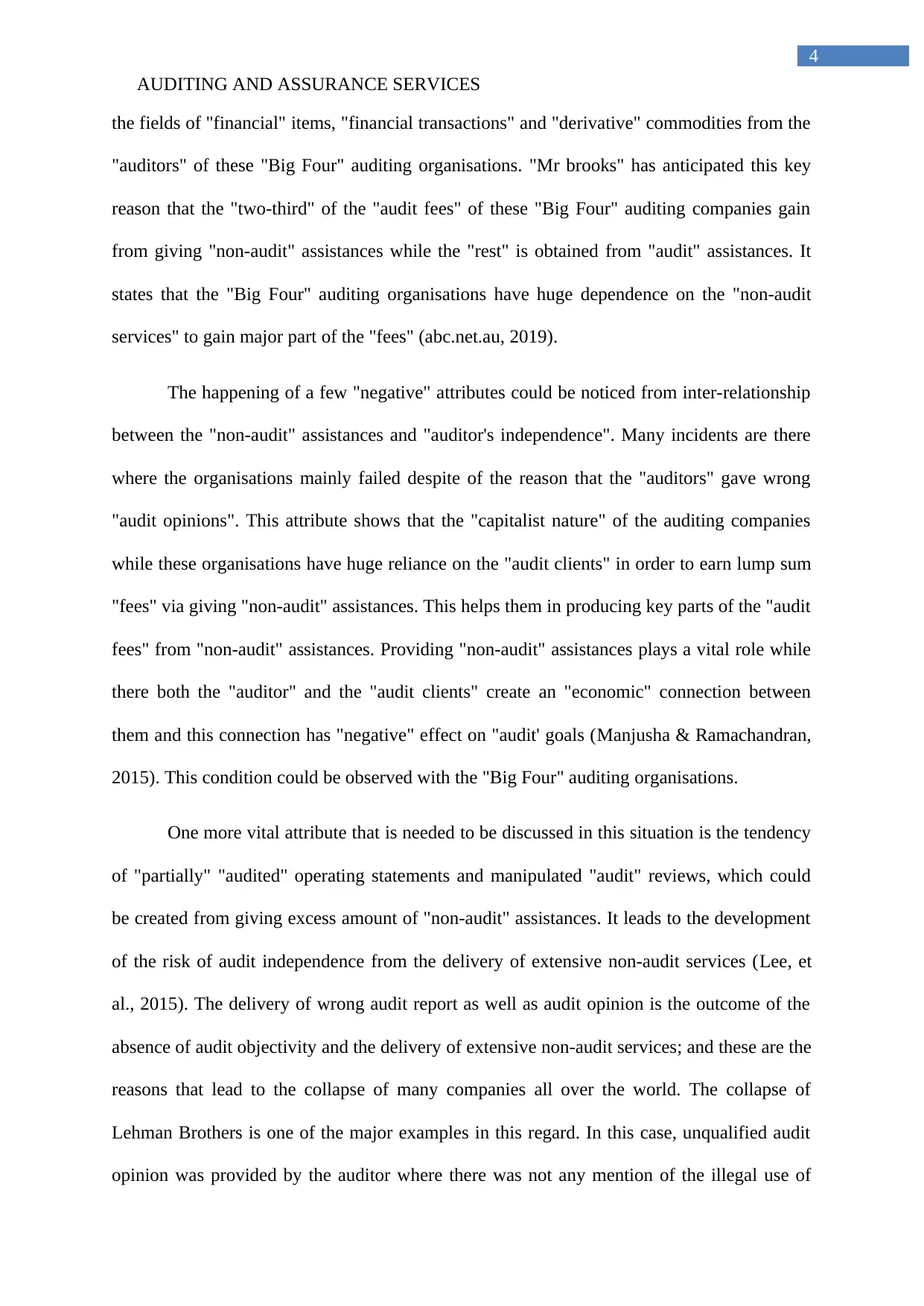
4
AUDITING AND ASSURANCE SERVICES
the fields of "financial" items, "financial transactions" and "derivative" commodities from the
"auditors" of these "Big Four" auditing organisations. "Mr brooks" has anticipated this key
reason that the "two-third" of the "audit fees" of these "Big Four" auditing companies gain
from giving "non-audit" assistances while the "rest" is obtained from "audit" assistances. It
states that the "Big Four" auditing organisations have huge dependence on the "non-audit
services" to gain major part of the "fees" (abc.net.au, 2019).
The happening of a few "negative" attributes could be noticed from inter-relationship
between the "non-audit" assistances and "auditor's independence". Many incidents are there
where the organisations mainly failed despite of the reason that the "auditors" gave wrong
"audit opinions". This attribute shows that the "capitalist nature" of the auditing companies
while these organisations have huge reliance on the "audit clients" in order to earn lump sum
"fees" via giving "non-audit" assistances. This helps them in producing key parts of the "audit
fees" from "non-audit" assistances. Providing "non-audit" assistances plays a vital role while
there both the "auditor" and the "audit clients" create an "economic" connection between
them and this connection has "negative" effect on "audit' goals (Manjusha & Ramachandran,
2015). This condition could be observed with the "Big Four" auditing organisations.
One more vital attribute that is needed to be discussed in this situation is the tendency
of "partially" "audited" operating statements and manipulated "audit" reviews, which could
be created from giving excess amount of "non-audit" assistances. It leads to the development
of the risk of audit independence from the delivery of extensive non-audit services (Lee, et
al., 2015). The delivery of wrong audit report as well as audit opinion is the outcome of the
absence of audit objectivity and the delivery of extensive non-audit services; and these are the
reasons that lead to the collapse of many companies all over the world. The collapse of
Lehman Brothers is one of the major examples in this regard. In this case, unqualified audit
opinion was provided by the auditor where there was not any mention of the illegal use of
AUDITING AND ASSURANCE SERVICES
the fields of "financial" items, "financial transactions" and "derivative" commodities from the
"auditors" of these "Big Four" auditing organisations. "Mr brooks" has anticipated this key
reason that the "two-third" of the "audit fees" of these "Big Four" auditing companies gain
from giving "non-audit" assistances while the "rest" is obtained from "audit" assistances. It
states that the "Big Four" auditing organisations have huge dependence on the "non-audit
services" to gain major part of the "fees" (abc.net.au, 2019).
The happening of a few "negative" attributes could be noticed from inter-relationship
between the "non-audit" assistances and "auditor's independence". Many incidents are there
where the organisations mainly failed despite of the reason that the "auditors" gave wrong
"audit opinions". This attribute shows that the "capitalist nature" of the auditing companies
while these organisations have huge reliance on the "audit clients" in order to earn lump sum
"fees" via giving "non-audit" assistances. This helps them in producing key parts of the "audit
fees" from "non-audit" assistances. Providing "non-audit" assistances plays a vital role while
there both the "auditor" and the "audit clients" create an "economic" connection between
them and this connection has "negative" effect on "audit' goals (Manjusha & Ramachandran,
2015). This condition could be observed with the "Big Four" auditing organisations.
One more vital attribute that is needed to be discussed in this situation is the tendency
of "partially" "audited" operating statements and manipulated "audit" reviews, which could
be created from giving excess amount of "non-audit" assistances. It leads to the development
of the risk of audit independence from the delivery of extensive non-audit services (Lee, et
al., 2015). The delivery of wrong audit report as well as audit opinion is the outcome of the
absence of audit objectivity and the delivery of extensive non-audit services; and these are the
reasons that lead to the collapse of many companies all over the world. The collapse of
Lehman Brothers is one of the major examples in this regard. In this case, unqualified audit
opinion was provided by the auditor where there was not any mention of the illegal use of
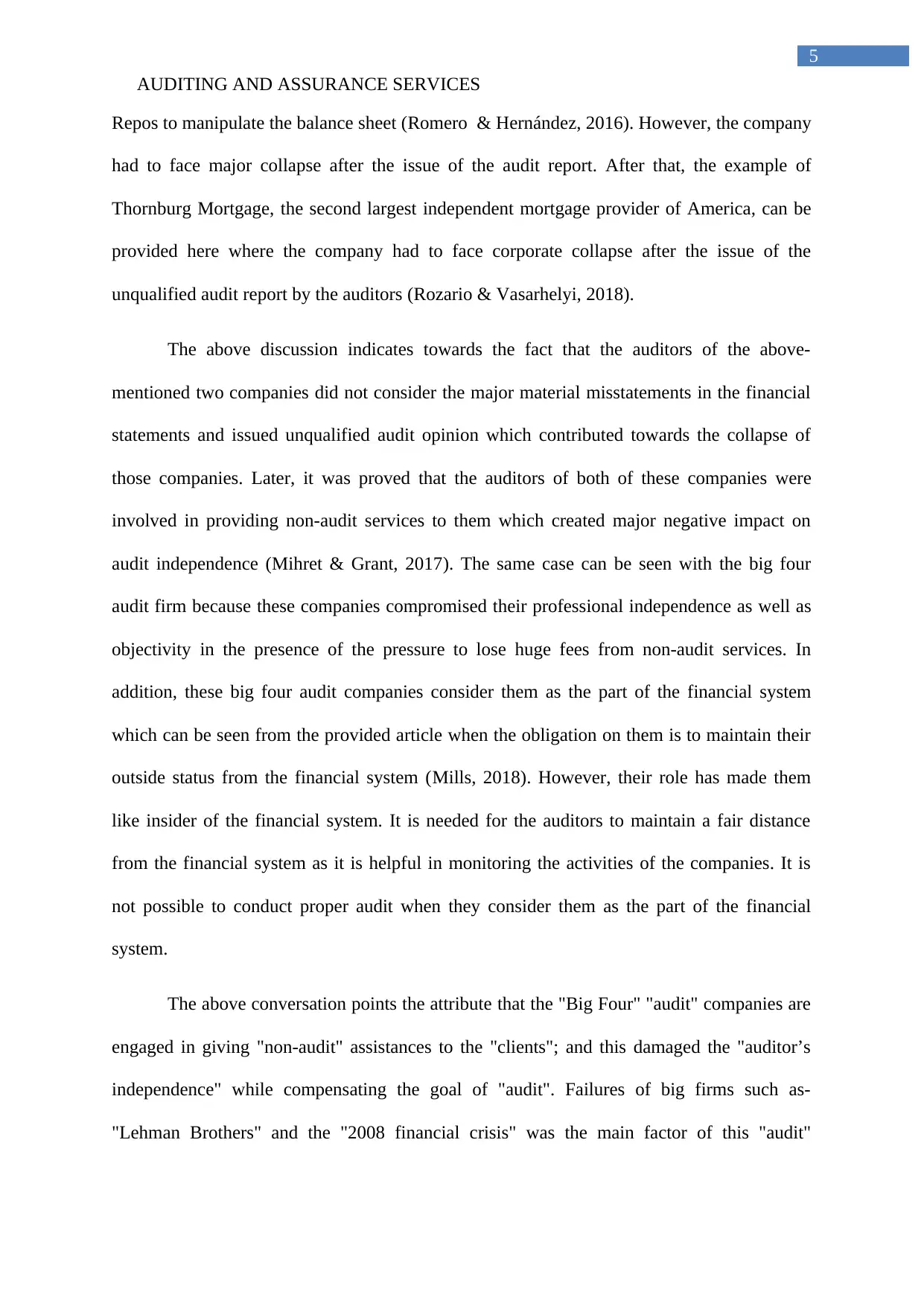
5
AUDITING AND ASSURANCE SERVICES
Repos to manipulate the balance sheet (Romero & Hernández, 2016). However, the company
had to face major collapse after the issue of the audit report. After that, the example of
Thornburg Mortgage, the second largest independent mortgage provider of America, can be
provided here where the company had to face corporate collapse after the issue of the
unqualified audit report by the auditors (Rozario & Vasarhelyi, 2018).
The above discussion indicates towards the fact that the auditors of the above-
mentioned two companies did not consider the major material misstatements in the financial
statements and issued unqualified audit opinion which contributed towards the collapse of
those companies. Later, it was proved that the auditors of both of these companies were
involved in providing non-audit services to them which created major negative impact on
audit independence (Mihret & Grant, 2017). The same case can be seen with the big four
audit firm because these companies compromised their professional independence as well as
objectivity in the presence of the pressure to lose huge fees from non-audit services. In
addition, these big four audit companies consider them as the part of the financial system
which can be seen from the provided article when the obligation on them is to maintain their
outside status from the financial system (Mills, 2018). However, their role has made them
like insider of the financial system. It is needed for the auditors to maintain a fair distance
from the financial system as it is helpful in monitoring the activities of the companies. It is
not possible to conduct proper audit when they consider them as the part of the financial
system.
The above conversation points the attribute that the "Big Four" "audit" companies are
engaged in giving "non-audit" assistances to the "clients"; and this damaged the "auditor’s
independence" while compensating the goal of "audit". Failures of big firms such as-
"Lehman Brothers" and the "2008 financial crisis" was the main factor of this "audit"
AUDITING AND ASSURANCE SERVICES
Repos to manipulate the balance sheet (Romero & Hernández, 2016). However, the company
had to face major collapse after the issue of the audit report. After that, the example of
Thornburg Mortgage, the second largest independent mortgage provider of America, can be
provided here where the company had to face corporate collapse after the issue of the
unqualified audit report by the auditors (Rozario & Vasarhelyi, 2018).
The above discussion indicates towards the fact that the auditors of the above-
mentioned two companies did not consider the major material misstatements in the financial
statements and issued unqualified audit opinion which contributed towards the collapse of
those companies. Later, it was proved that the auditors of both of these companies were
involved in providing non-audit services to them which created major negative impact on
audit independence (Mihret & Grant, 2017). The same case can be seen with the big four
audit firm because these companies compromised their professional independence as well as
objectivity in the presence of the pressure to lose huge fees from non-audit services. In
addition, these big four audit companies consider them as the part of the financial system
which can be seen from the provided article when the obligation on them is to maintain their
outside status from the financial system (Mills, 2018). However, their role has made them
like insider of the financial system. It is needed for the auditors to maintain a fair distance
from the financial system as it is helpful in monitoring the activities of the companies. It is
not possible to conduct proper audit when they consider them as the part of the financial
system.
The above conversation points the attribute that the "Big Four" "audit" companies are
engaged in giving "non-audit" assistances to the "clients"; and this damaged the "auditor’s
independence" while compensating the goal of "audit". Failures of big firms such as-
"Lehman Brothers" and the "2008 financial crisis" was the main factor of this "audit"
⊘ This is a preview!⊘
Do you want full access?
Subscribe today to unlock all pages.

Trusted by 1+ million students worldwide
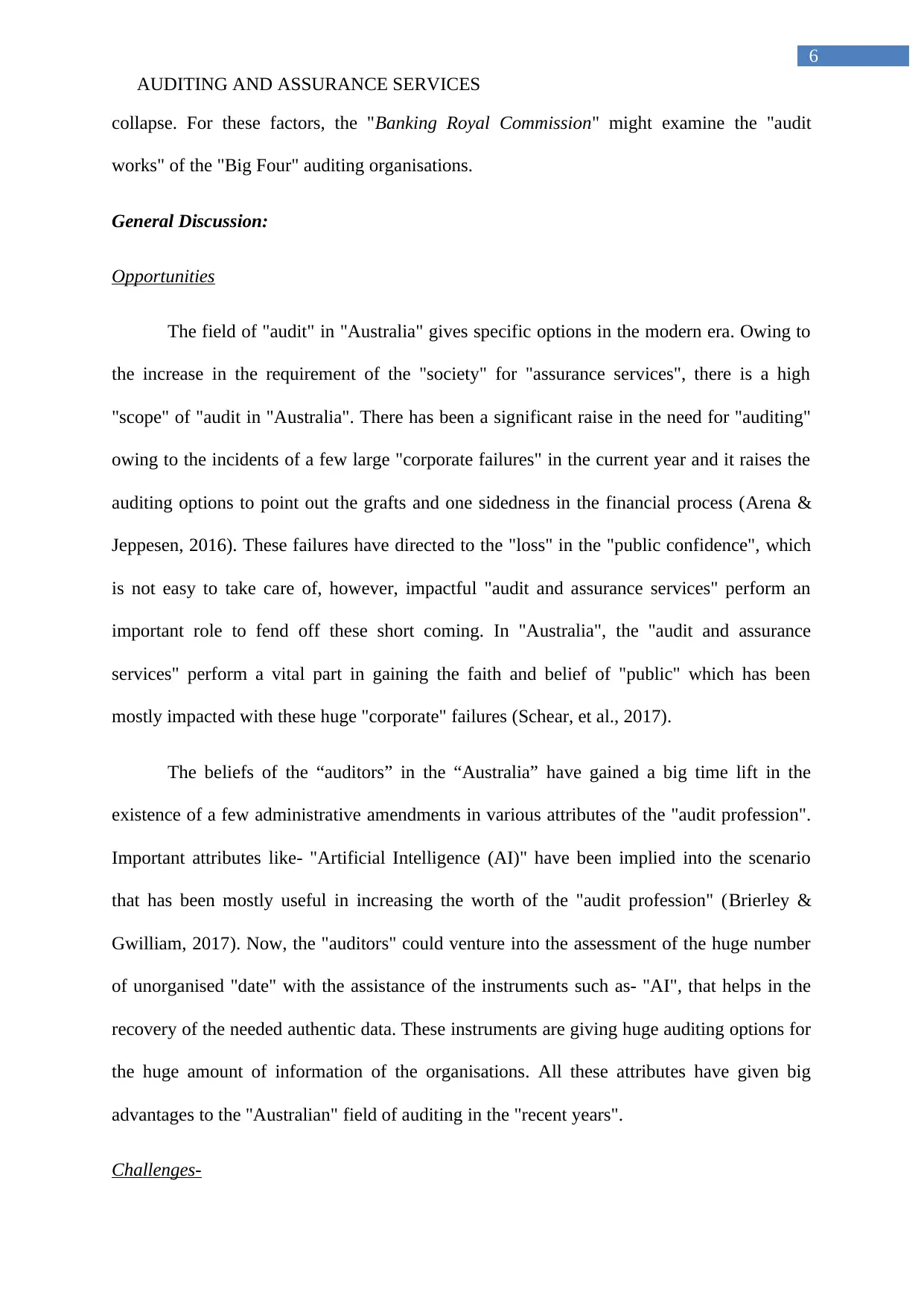
6
AUDITING AND ASSURANCE SERVICES
collapse. For these factors, the "Banking Royal Commission" might examine the "audit
works" of the "Big Four" auditing organisations.
General Discussion:
Opportunities
The field of "audit" in "Australia" gives specific options in the modern era. Owing to
the increase in the requirement of the "society" for "assurance services", there is a high
"scope" of "audit in "Australia". There has been a significant raise in the need for "auditing"
owing to the incidents of a few large "corporate failures" in the current year and it raises the
auditing options to point out the grafts and one sidedness in the financial process (Arena &
Jeppesen, 2016). These failures have directed to the "loss" in the "public confidence", which
is not easy to take care of, however, impactful "audit and assurance services" perform an
important role to fend off these short coming. In "Australia", the "audit and assurance
services" perform a vital part in gaining the faith and belief of "public" which has been
mostly impacted with these huge "corporate" failures (Schear, et al., 2017).
The beliefs of the “auditors” in the “Australia” have gained a big time lift in the
existence of a few administrative amendments in various attributes of the "audit profession".
Important attributes like- "Artificial Intelligence (AI)" have been implied into the scenario
that has been mostly useful in increasing the worth of the "audit profession" (Brierley &
Gwilliam, 2017). Now, the "auditors" could venture into the assessment of the huge number
of unorganised "date" with the assistance of the instruments such as- "AI", that helps in the
recovery of the needed authentic data. These instruments are giving huge auditing options for
the huge amount of information of the organisations. All these attributes have given big
advantages to the "Australian" field of auditing in the "recent years".
Challenges-
AUDITING AND ASSURANCE SERVICES
collapse. For these factors, the "Banking Royal Commission" might examine the "audit
works" of the "Big Four" auditing organisations.
General Discussion:
Opportunities
The field of "audit" in "Australia" gives specific options in the modern era. Owing to
the increase in the requirement of the "society" for "assurance services", there is a high
"scope" of "audit in "Australia". There has been a significant raise in the need for "auditing"
owing to the incidents of a few large "corporate failures" in the current year and it raises the
auditing options to point out the grafts and one sidedness in the financial process (Arena &
Jeppesen, 2016). These failures have directed to the "loss" in the "public confidence", which
is not easy to take care of, however, impactful "audit and assurance services" perform an
important role to fend off these short coming. In "Australia", the "audit and assurance
services" perform a vital part in gaining the faith and belief of "public" which has been
mostly impacted with these huge "corporate" failures (Schear, et al., 2017).
The beliefs of the “auditors” in the “Australia” have gained a big time lift in the
existence of a few administrative amendments in various attributes of the "audit profession".
Important attributes like- "Artificial Intelligence (AI)" have been implied into the scenario
that has been mostly useful in increasing the worth of the "audit profession" (Brierley &
Gwilliam, 2017). Now, the "auditors" could venture into the assessment of the huge number
of unorganised "date" with the assistance of the instruments such as- "AI", that helps in the
recovery of the needed authentic data. These instruments are giving huge auditing options for
the huge amount of information of the organisations. All these attributes have given big
advantages to the "Australian" field of auditing in the "recent years".
Challenges-
Paraphrase This Document
Need a fresh take? Get an instant paraphrase of this document with our AI Paraphraser
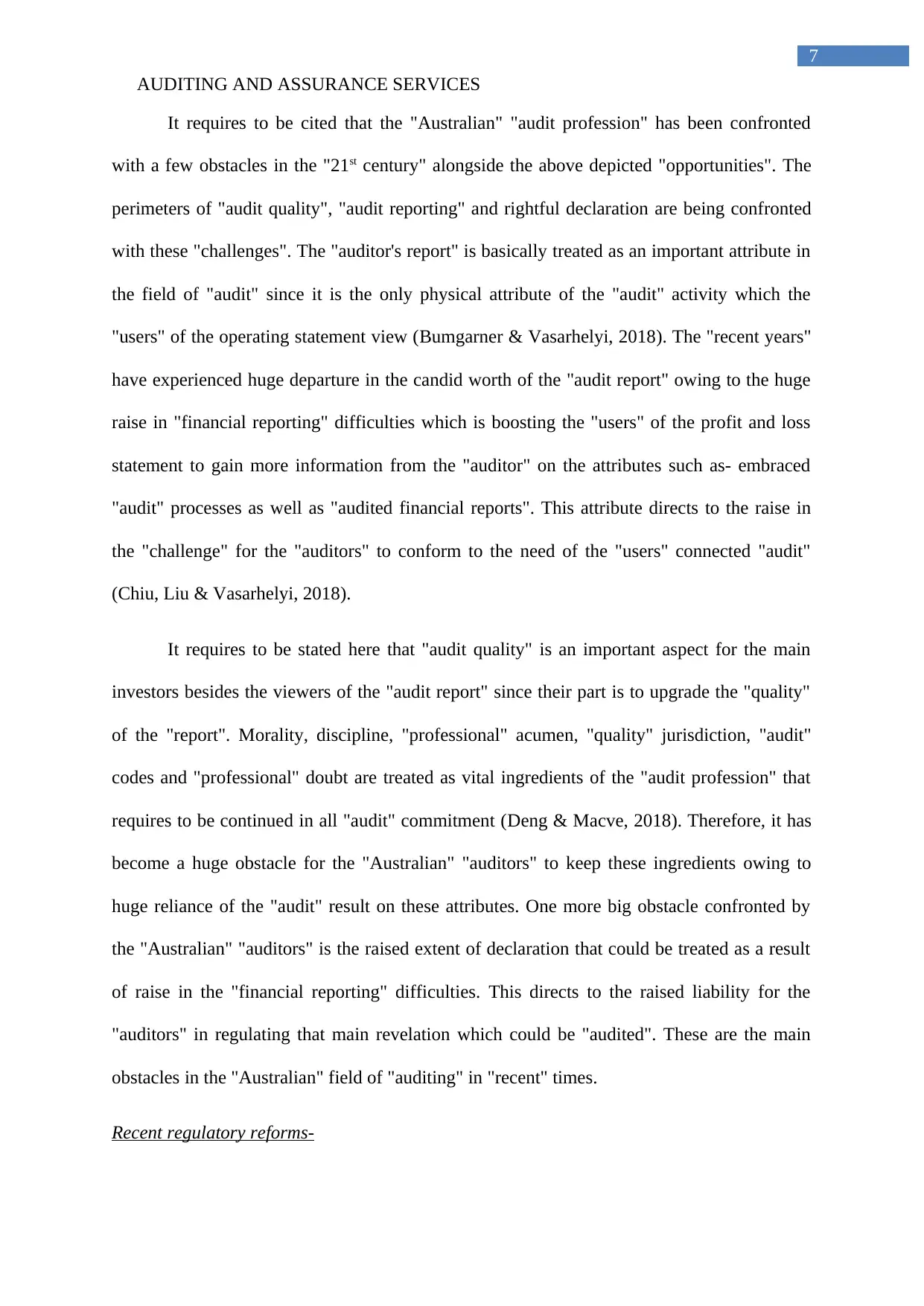
7
AUDITING AND ASSURANCE SERVICES
It requires to be cited that the "Australian" "audit profession" has been confronted
with a few obstacles in the "21st century" alongside the above depicted "opportunities". The
perimeters of "audit quality", "audit reporting" and rightful declaration are being confronted
with these "challenges". The "auditor's report" is basically treated as an important attribute in
the field of "audit" since it is the only physical attribute of the "audit" activity which the
"users" of the operating statement view (Bumgarner & Vasarhelyi, 2018). The "recent years"
have experienced huge departure in the candid worth of the "audit report" owing to the huge
raise in "financial reporting" difficulties which is boosting the "users" of the profit and loss
statement to gain more information from the "auditor" on the attributes such as- embraced
"audit" processes as well as "audited financial reports". This attribute directs to the raise in
the "challenge" for the "auditors" to conform to the need of the "users" connected "audit"
(Chiu, Liu & Vasarhelyi, 2018).
It requires to be stated here that "audit quality" is an important aspect for the main
investors besides the viewers of the "audit report" since their part is to upgrade the "quality"
of the "report". Morality, discipline, "professional" acumen, "quality" jurisdiction, "audit"
codes and "professional" doubt are treated as vital ingredients of the "audit profession" that
requires to be continued in all "audit" commitment (Deng & Macve, 2018). Therefore, it has
become a huge obstacle for the "Australian" "auditors" to keep these ingredients owing to
huge reliance of the "audit" result on these attributes. One more big obstacle confronted by
the "Australian" "auditors" is the raised extent of declaration that could be treated as a result
of raise in the "financial reporting" difficulties. This directs to the raised liability for the
"auditors" in regulating that main revelation which could be "audited". These are the main
obstacles in the "Australian" field of "auditing" in "recent" times.
Recent regulatory reforms-
AUDITING AND ASSURANCE SERVICES
It requires to be cited that the "Australian" "audit profession" has been confronted
with a few obstacles in the "21st century" alongside the above depicted "opportunities". The
perimeters of "audit quality", "audit reporting" and rightful declaration are being confronted
with these "challenges". The "auditor's report" is basically treated as an important attribute in
the field of "audit" since it is the only physical attribute of the "audit" activity which the
"users" of the operating statement view (Bumgarner & Vasarhelyi, 2018). The "recent years"
have experienced huge departure in the candid worth of the "audit report" owing to the huge
raise in "financial reporting" difficulties which is boosting the "users" of the profit and loss
statement to gain more information from the "auditor" on the attributes such as- embraced
"audit" processes as well as "audited financial reports". This attribute directs to the raise in
the "challenge" for the "auditors" to conform to the need of the "users" connected "audit"
(Chiu, Liu & Vasarhelyi, 2018).
It requires to be stated here that "audit quality" is an important aspect for the main
investors besides the viewers of the "audit report" since their part is to upgrade the "quality"
of the "report". Morality, discipline, "professional" acumen, "quality" jurisdiction, "audit"
codes and "professional" doubt are treated as vital ingredients of the "audit profession" that
requires to be continued in all "audit" commitment (Deng & Macve, 2018). Therefore, it has
become a huge obstacle for the "Australian" "auditors" to keep these ingredients owing to
huge reliance of the "audit" result on these attributes. One more big obstacle confronted by
the "Australian" "auditors" is the raised extent of declaration that could be treated as a result
of raise in the "financial reporting" difficulties. This directs to the raised liability for the
"auditors" in regulating that main revelation which could be "audited". These are the main
obstacles in the "Australian" field of "auditing" in "recent" times.
Recent regulatory reforms-
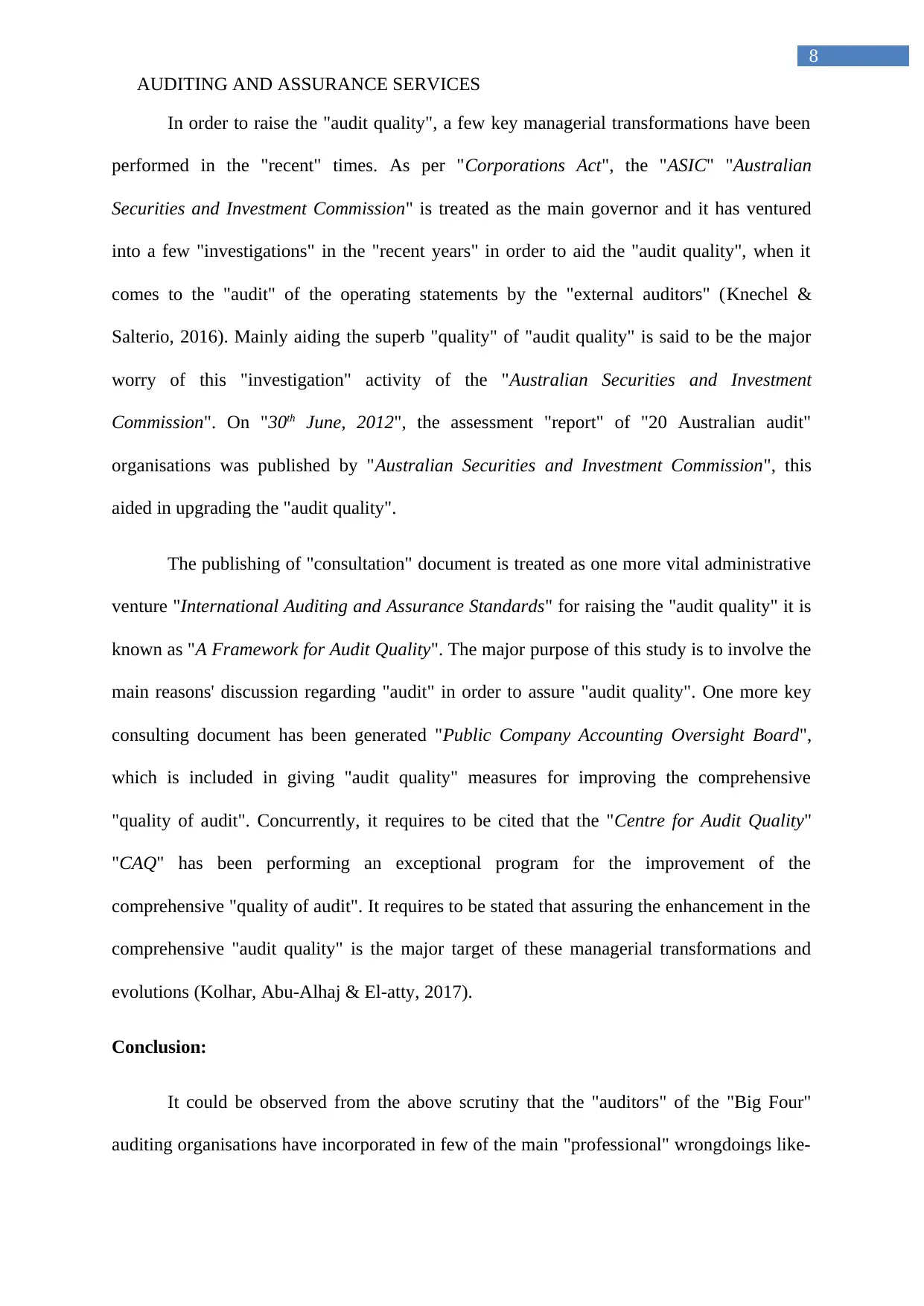
8
AUDITING AND ASSURANCE SERVICES
In order to raise the "audit quality", a few key managerial transformations have been
performed in the "recent" times. As per "Corporations Act", the "ASIC" "Australian
Securities and Investment Commission" is treated as the main governor and it has ventured
into a few "investigations" in the "recent years" in order to aid the "audit quality", when it
comes to the "audit" of the operating statements by the "external auditors" (Knechel &
Salterio, 2016). Mainly aiding the superb "quality" of "audit quality" is said to be the major
worry of this "investigation" activity of the "Australian Securities and Investment
Commission". On "30th June, 2012", the assessment "report" of "20 Australian audit"
organisations was published by "Australian Securities and Investment Commission", this
aided in upgrading the "audit quality".
The publishing of "consultation" document is treated as one more vital administrative
venture "International Auditing and Assurance Standards" for raising the "audit quality" it is
known as "A Framework for Audit Quality". The major purpose of this study is to involve the
main reasons' discussion regarding "audit" in order to assure "audit quality". One more key
consulting document has been generated "Public Company Accounting Oversight Board",
which is included in giving "audit quality" measures for improving the comprehensive
"quality of audit". Concurrently, it requires to be cited that the "Centre for Audit Quality"
"CAQ" has been performing an exceptional program for the improvement of the
comprehensive "quality of audit". It requires to be stated that assuring the enhancement in the
comprehensive "audit quality" is the major target of these managerial transformations and
evolutions (Kolhar, Abu-Alhaj & El-atty, 2017).
Conclusion:
It could be observed from the above scrutiny that the "auditors" of the "Big Four"
auditing organisations have incorporated in few of the main "professional" wrongdoings like-
AUDITING AND ASSURANCE SERVICES
In order to raise the "audit quality", a few key managerial transformations have been
performed in the "recent" times. As per "Corporations Act", the "ASIC" "Australian
Securities and Investment Commission" is treated as the main governor and it has ventured
into a few "investigations" in the "recent years" in order to aid the "audit quality", when it
comes to the "audit" of the operating statements by the "external auditors" (Knechel &
Salterio, 2016). Mainly aiding the superb "quality" of "audit quality" is said to be the major
worry of this "investigation" activity of the "Australian Securities and Investment
Commission". On "30th June, 2012", the assessment "report" of "20 Australian audit"
organisations was published by "Australian Securities and Investment Commission", this
aided in upgrading the "audit quality".
The publishing of "consultation" document is treated as one more vital administrative
venture "International Auditing and Assurance Standards" for raising the "audit quality" it is
known as "A Framework for Audit Quality". The major purpose of this study is to involve the
main reasons' discussion regarding "audit" in order to assure "audit quality". One more key
consulting document has been generated "Public Company Accounting Oversight Board",
which is included in giving "audit quality" measures for improving the comprehensive
"quality of audit". Concurrently, it requires to be cited that the "Centre for Audit Quality"
"CAQ" has been performing an exceptional program for the improvement of the
comprehensive "quality of audit". It requires to be stated that assuring the enhancement in the
comprehensive "audit quality" is the major target of these managerial transformations and
evolutions (Kolhar, Abu-Alhaj & El-atty, 2017).
Conclusion:
It could be observed from the above scrutiny that the "auditors" of the "Big Four"
auditing organisations have incorporated in few of the main "professional" wrongdoings like-
⊘ This is a preview!⊘
Do you want full access?
Subscribe today to unlock all pages.

Trusted by 1+ million students worldwide
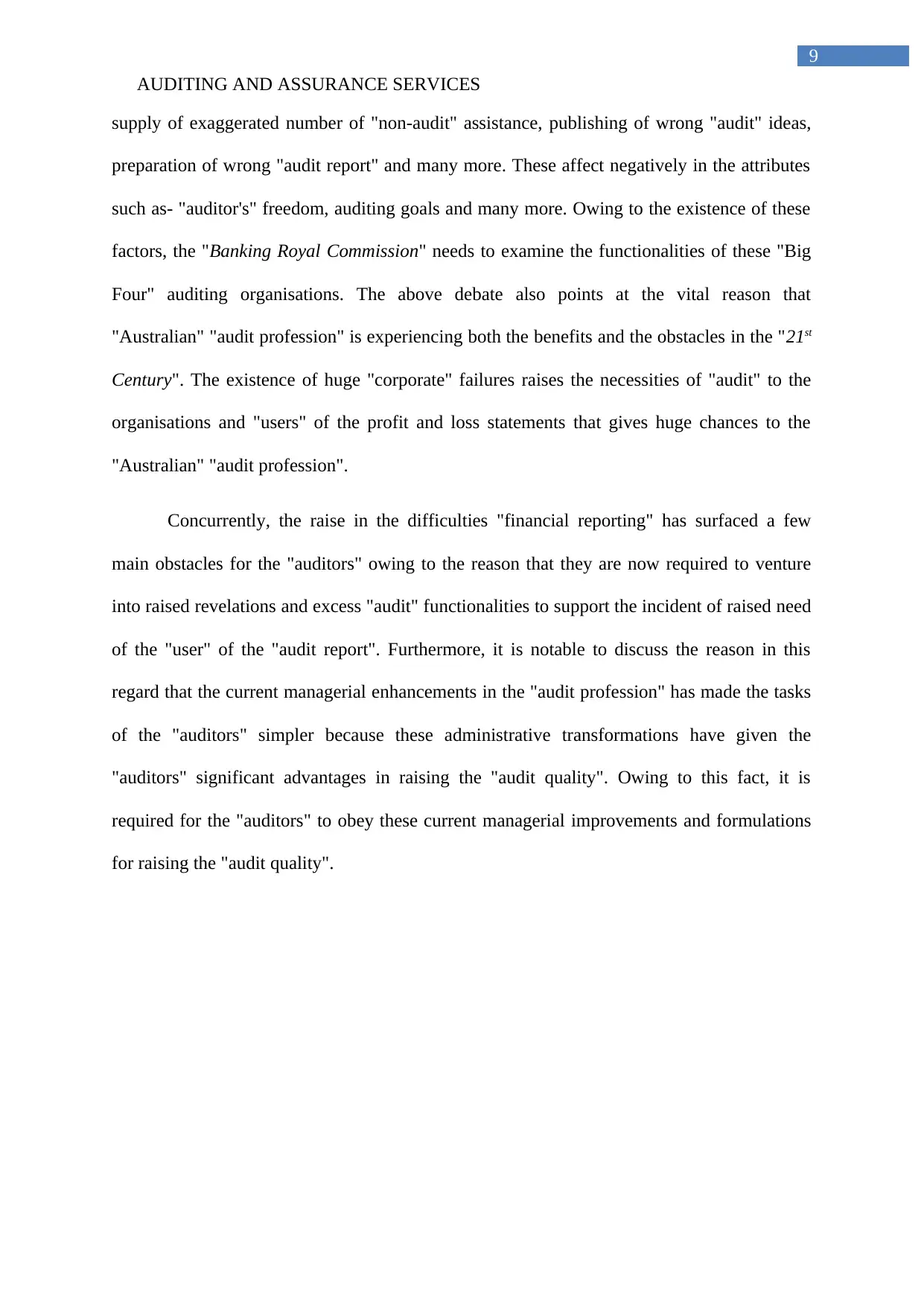
9
AUDITING AND ASSURANCE SERVICES
supply of exaggerated number of "non-audit" assistance, publishing of wrong "audit" ideas,
preparation of wrong "audit report" and many more. These affect negatively in the attributes
such as- "auditor's" freedom, auditing goals and many more. Owing to the existence of these
factors, the "Banking Royal Commission" needs to examine the functionalities of these "Big
Four" auditing organisations. The above debate also points at the vital reason that
"Australian" "audit profession" is experiencing both the benefits and the obstacles in the "21st
Century". The existence of huge "corporate" failures raises the necessities of "audit" to the
organisations and "users" of the profit and loss statements that gives huge chances to the
"Australian" "audit profession".
Concurrently, the raise in the difficulties "financial reporting" has surfaced a few
main obstacles for the "auditors" owing to the reason that they are now required to venture
into raised revelations and excess "audit" functionalities to support the incident of raised need
of the "user" of the "audit report". Furthermore, it is notable to discuss the reason in this
regard that the current managerial enhancements in the "audit profession" has made the tasks
of the "auditors" simpler because these administrative transformations have given the
"auditors" significant advantages in raising the "audit quality". Owing to this fact, it is
required for the "auditors" to obey these current managerial improvements and formulations
for raising the "audit quality".
AUDITING AND ASSURANCE SERVICES
supply of exaggerated number of "non-audit" assistance, publishing of wrong "audit" ideas,
preparation of wrong "audit report" and many more. These affect negatively in the attributes
such as- "auditor's" freedom, auditing goals and many more. Owing to the existence of these
factors, the "Banking Royal Commission" needs to examine the functionalities of these "Big
Four" auditing organisations. The above debate also points at the vital reason that
"Australian" "audit profession" is experiencing both the benefits and the obstacles in the "21st
Century". The existence of huge "corporate" failures raises the necessities of "audit" to the
organisations and "users" of the profit and loss statements that gives huge chances to the
"Australian" "audit profession".
Concurrently, the raise in the difficulties "financial reporting" has surfaced a few
main obstacles for the "auditors" owing to the reason that they are now required to venture
into raised revelations and excess "audit" functionalities to support the incident of raised need
of the "user" of the "audit report". Furthermore, it is notable to discuss the reason in this
regard that the current managerial enhancements in the "audit profession" has made the tasks
of the "auditors" simpler because these administrative transformations have given the
"auditors" significant advantages in raising the "audit quality". Owing to this fact, it is
required for the "auditors" to obey these current managerial improvements and formulations
for raising the "audit quality".
Paraphrase This Document
Need a fresh take? Get an instant paraphrase of this document with our AI Paraphraser
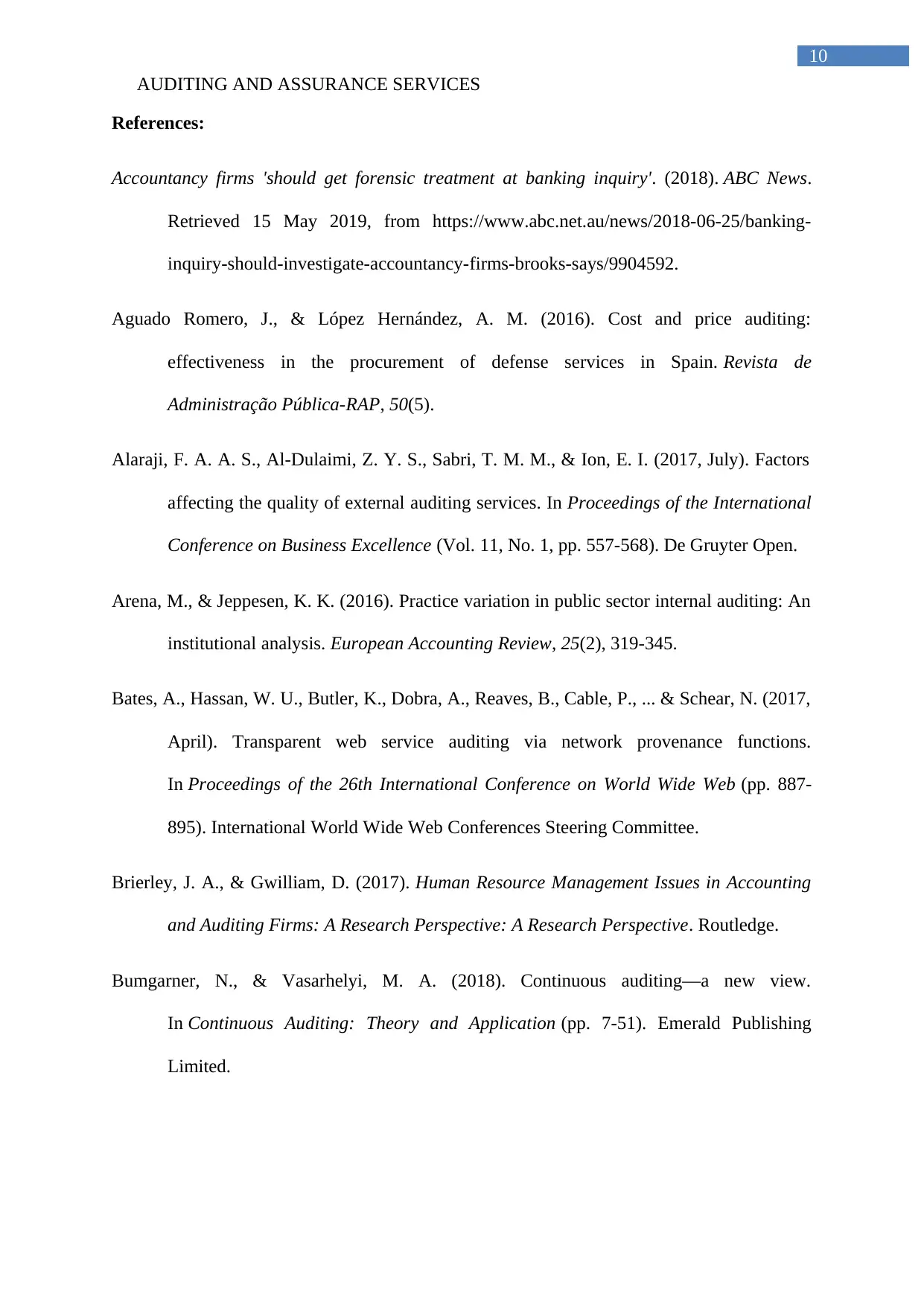
10
AUDITING AND ASSURANCE SERVICES
References:
Accountancy firms 'should get forensic treatment at banking inquiry'. (2018). ABC News.
Retrieved 15 May 2019, from https://www.abc.net.au/news/2018-06-25/banking-
inquiry-should-investigate-accountancy-firms-brooks-says/9904592.
Aguado Romero, J., & López Hernández, A. M. (2016). Cost and price auditing:
effectiveness in the procurement of defense services in Spain. Revista de
Administração Pública-RAP, 50(5).
Alaraji, F. A. A. S., Al-Dulaimi, Z. Y. S., Sabri, T. M. M., & Ion, E. I. (2017, July). Factors
affecting the quality of external auditing services. In Proceedings of the International
Conference on Business Excellence (Vol. 11, No. 1, pp. 557-568). De Gruyter Open.
Arena, M., & Jeppesen, K. K. (2016). Practice variation in public sector internal auditing: An
institutional analysis. European Accounting Review, 25(2), 319-345.
Bates, A., Hassan, W. U., Butler, K., Dobra, A., Reaves, B., Cable, P., ... & Schear, N. (2017,
April). Transparent web service auditing via network provenance functions.
In Proceedings of the 26th International Conference on World Wide Web (pp. 887-
895). International World Wide Web Conferences Steering Committee.
Brierley, J. A., & Gwilliam, D. (2017). Human Resource Management Issues in Accounting
and Auditing Firms: A Research Perspective: A Research Perspective. Routledge.
Bumgarner, N., & Vasarhelyi, M. A. (2018). Continuous auditing—a new view.
In Continuous Auditing: Theory and Application (pp. 7-51). Emerald Publishing
Limited.
AUDITING AND ASSURANCE SERVICES
References:
Accountancy firms 'should get forensic treatment at banking inquiry'. (2018). ABC News.
Retrieved 15 May 2019, from https://www.abc.net.au/news/2018-06-25/banking-
inquiry-should-investigate-accountancy-firms-brooks-says/9904592.
Aguado Romero, J., & López Hernández, A. M. (2016). Cost and price auditing:
effectiveness in the procurement of defense services in Spain. Revista de
Administração Pública-RAP, 50(5).
Alaraji, F. A. A. S., Al-Dulaimi, Z. Y. S., Sabri, T. M. M., & Ion, E. I. (2017, July). Factors
affecting the quality of external auditing services. In Proceedings of the International
Conference on Business Excellence (Vol. 11, No. 1, pp. 557-568). De Gruyter Open.
Arena, M., & Jeppesen, K. K. (2016). Practice variation in public sector internal auditing: An
institutional analysis. European Accounting Review, 25(2), 319-345.
Bates, A., Hassan, W. U., Butler, K., Dobra, A., Reaves, B., Cable, P., ... & Schear, N. (2017,
April). Transparent web service auditing via network provenance functions.
In Proceedings of the 26th International Conference on World Wide Web (pp. 887-
895). International World Wide Web Conferences Steering Committee.
Brierley, J. A., & Gwilliam, D. (2017). Human Resource Management Issues in Accounting
and Auditing Firms: A Research Perspective: A Research Perspective. Routledge.
Bumgarner, N., & Vasarhelyi, M. A. (2018). Continuous auditing—a new view.
In Continuous Auditing: Theory and Application (pp. 7-51). Emerald Publishing
Limited.
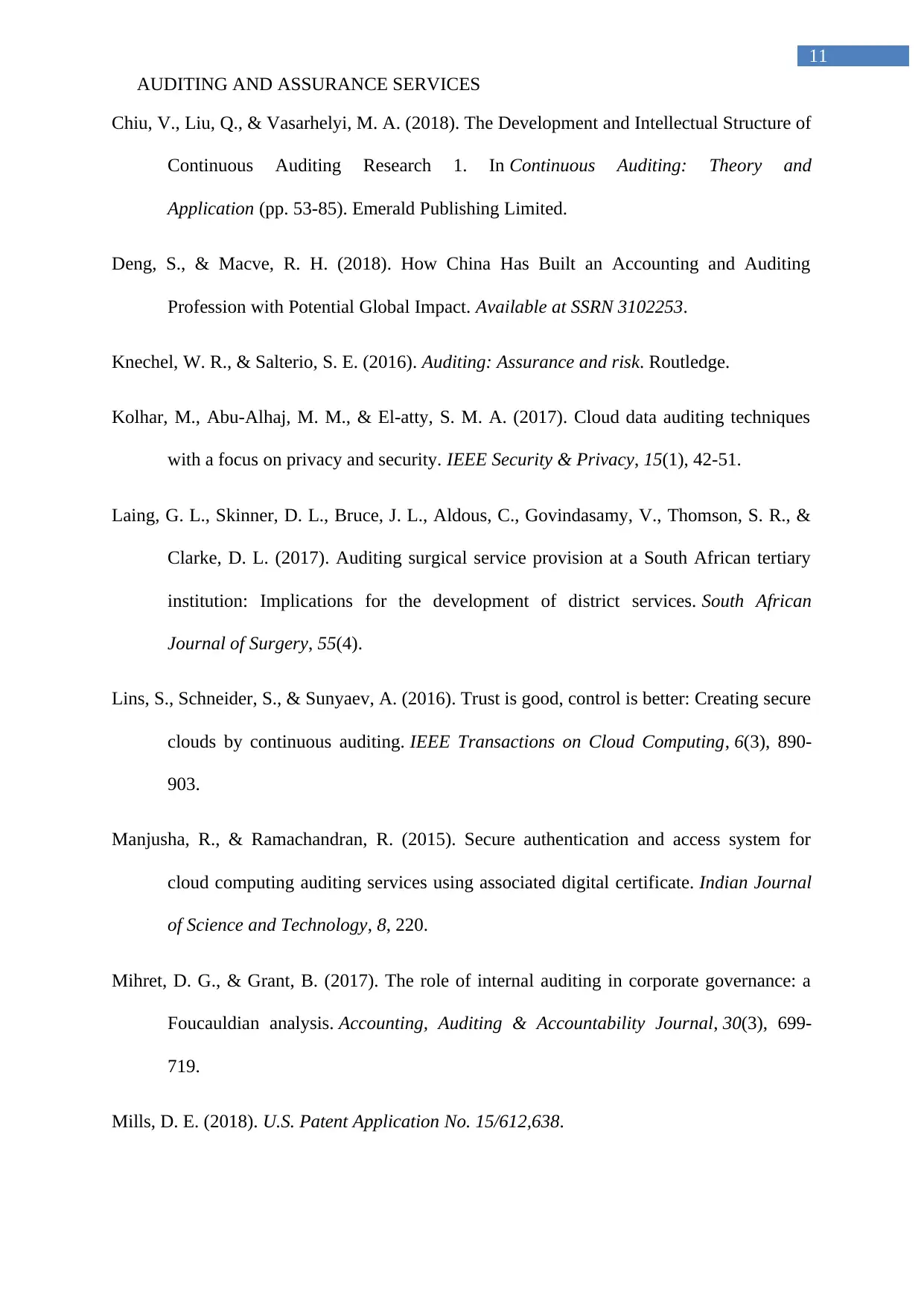
11
AUDITING AND ASSURANCE SERVICES
Chiu, V., Liu, Q., & Vasarhelyi, M. A. (2018). The Development and Intellectual Structure of
Continuous Auditing Research 1. In Continuous Auditing: Theory and
Application (pp. 53-85). Emerald Publishing Limited.
Deng, S., & Macve, R. H. (2018). How China Has Built an Accounting and Auditing
Profession with Potential Global Impact. Available at SSRN 3102253.
Knechel, W. R., & Salterio, S. E. (2016). Auditing: Assurance and risk. Routledge.
Kolhar, M., Abu-Alhaj, M. M., & El-atty, S. M. A. (2017). Cloud data auditing techniques
with a focus on privacy and security. IEEE Security & Privacy, 15(1), 42-51.
Laing, G. L., Skinner, D. L., Bruce, J. L., Aldous, C., Govindasamy, V., Thomson, S. R., &
Clarke, D. L. (2017). Auditing surgical service provision at a South African tertiary
institution: Implications for the development of district services. South African
Journal of Surgery, 55(4).
Lins, S., Schneider, S., & Sunyaev, A. (2016). Trust is good, control is better: Creating secure
clouds by continuous auditing. IEEE Transactions on Cloud Computing, 6(3), 890-
903.
Manjusha, R., & Ramachandran, R. (2015). Secure authentication and access system for
cloud computing auditing services using associated digital certificate. Indian Journal
of Science and Technology, 8, 220.
Mihret, D. G., & Grant, B. (2017). The role of internal auditing in corporate governance: a
Foucauldian analysis. Accounting, Auditing & Accountability Journal, 30(3), 699-
719.
Mills, D. E. (2018). U.S. Patent Application No. 15/612,638.
AUDITING AND ASSURANCE SERVICES
Chiu, V., Liu, Q., & Vasarhelyi, M. A. (2018). The Development and Intellectual Structure of
Continuous Auditing Research 1. In Continuous Auditing: Theory and
Application (pp. 53-85). Emerald Publishing Limited.
Deng, S., & Macve, R. H. (2018). How China Has Built an Accounting and Auditing
Profession with Potential Global Impact. Available at SSRN 3102253.
Knechel, W. R., & Salterio, S. E. (2016). Auditing: Assurance and risk. Routledge.
Kolhar, M., Abu-Alhaj, M. M., & El-atty, S. M. A. (2017). Cloud data auditing techniques
with a focus on privacy and security. IEEE Security & Privacy, 15(1), 42-51.
Laing, G. L., Skinner, D. L., Bruce, J. L., Aldous, C., Govindasamy, V., Thomson, S. R., &
Clarke, D. L. (2017). Auditing surgical service provision at a South African tertiary
institution: Implications for the development of district services. South African
Journal of Surgery, 55(4).
Lins, S., Schneider, S., & Sunyaev, A. (2016). Trust is good, control is better: Creating secure
clouds by continuous auditing. IEEE Transactions on Cloud Computing, 6(3), 890-
903.
Manjusha, R., & Ramachandran, R. (2015). Secure authentication and access system for
cloud computing auditing services using associated digital certificate. Indian Journal
of Science and Technology, 8, 220.
Mihret, D. G., & Grant, B. (2017). The role of internal auditing in corporate governance: a
Foucauldian analysis. Accounting, Auditing & Accountability Journal, 30(3), 699-
719.
Mills, D. E. (2018). U.S. Patent Application No. 15/612,638.
⊘ This is a preview!⊘
Do you want full access?
Subscribe today to unlock all pages.

Trusted by 1+ million students worldwide
1 out of 13
Related Documents
Your All-in-One AI-Powered Toolkit for Academic Success.
+13062052269
info@desklib.com
Available 24*7 on WhatsApp / Email
![[object Object]](/_next/static/media/star-bottom.7253800d.svg)
Unlock your academic potential
Copyright © 2020–2026 A2Z Services. All Rights Reserved. Developed and managed by ZUCOL.





